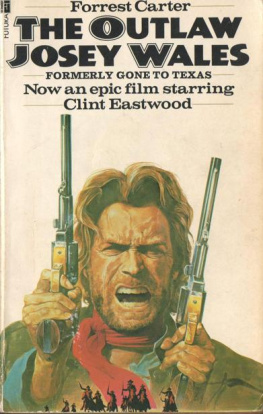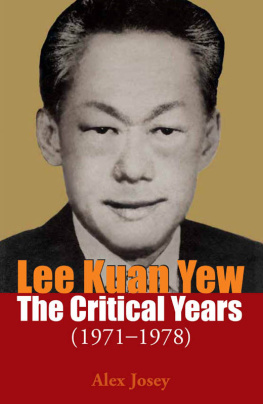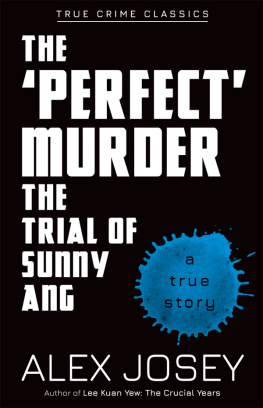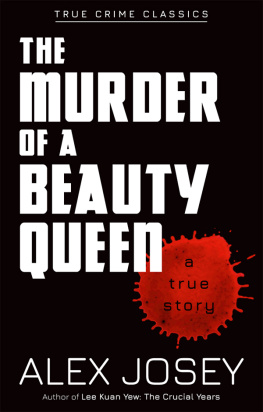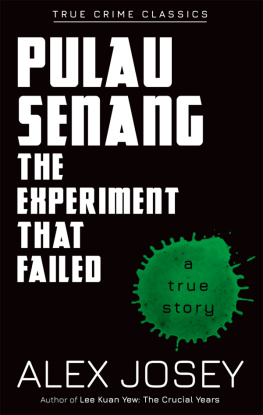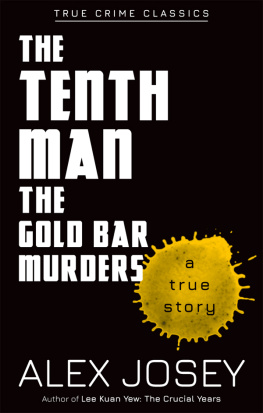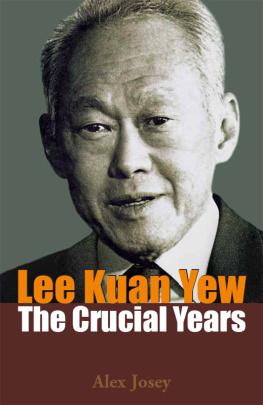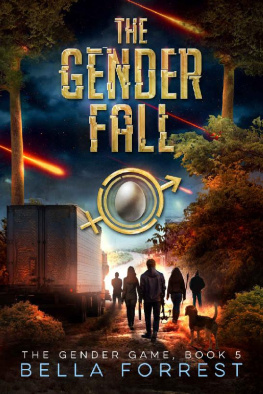Forrest Carter - The Outlaw Josey Wales
Here you can read online Forrest Carter - The Outlaw Josey Wales full text of the book (entire story) in english for free. Download pdf and epub, get meaning, cover and reviews about this ebook. year: 2010, publisher: Leisure Books, genre: Adventure. Description of the work, (preface) as well as reviews are available. Best literature library LitArk.com created for fans of good reading and offers a wide selection of genres:
Romance novel
Science fiction
Adventure
Detective
Science
History
Home and family
Prose
Art
Politics
Computer
Non-fiction
Religion
Business
Children
Humor
Choose a favorite category and find really read worthwhile books. Enjoy immersion in the world of imagination, feel the emotions of the characters or learn something new for yourself, make an fascinating discovery.
- Book:The Outlaw Josey Wales
- Author:
- Publisher:Leisure Books
- Genre:
- Year:2010
- Rating:3 / 5
- Favourites:Add to favourites
- Your mark:
- 60
- 1
- 2
- 3
- 4
- 5
The Outlaw Josey Wales: summary, description and annotation
We offer to read an annotation, description, summary or preface (depends on what the author of the book "The Outlaw Josey Wales" wrote himself). If you haven't found the necessary information about the book — write in the comments, we will try to find it.
The Outlaw Josey Wales — read online for free the complete book (whole text) full work
Below is the text of the book, divided by pages. System saving the place of the last page read, allows you to conveniently read the book "The Outlaw Josey Wales" online for free, without having to search again every time where you left off. Put a bookmark, and you can go to the page where you finished reading at any time.
Font size:
Interval:
Bookmark:
GONE TO TEXAS AKA THE OUTLAW JOSEY WALES
BY FORREST CARTER
Forrest Carter, whose Indian name is Little Tree, is known as Storyteller in Council to the Cherokee Nations. Orphaned at the age of five, he lived with his grandpa (half Cherokee) and his grandma (full Cherokee) in Tennessee until their deaths when he was ten. He has been on his own ever since. He has worked ranches in the South and Southwest - calls Dallas County, Texas, home. History is his main interest, especially of the South-Southwest and the Indian; he uses the council storytelling method of the Indian in passing on the history of his people. A number of Indian organisations will share in the proceeds of this book.
Copyright 2011 Pages Of Death. If anybody asks, I own the copyright, okay? That means that everyone who downloads this has to either pay me 10, or make me a sandwich, I dont care which.
Preface
Missouri is called the Mother of Outlaws. She acquired her title in the aftermath of the Civil War, when bitter men who had fought without benefit of rules in the Border War (a war within a War) could find no place for themselves in a society of old enmities and Reconstruction government. They rode and lived aimlessly, in the vicious circle of reprisal, robbery, and shoot-out that led to nowhere. The Cause was gone, and all that remained was personal feud, retribution... and survival. Many of them drifted to Texas.
If Missouri was the Mother, then Texas was the Father... the refuge, with boundless terrain and bloody frontier, where a proficient pistolman could find reason for existence and room to ride. The initials GIT, hurriedly carved on the doorpost of a Southern shack, was message enough to relatives and friends that the carver was in law trouble, and Gone To Texas.
In those days they werent called gunfighters; that came in the 188os from the dime noveleers. They were called pistolmen, and they referred to their weapon as a "pistol, or by the make ... a Colts .44. The Missouri guerrilla was the first expert pistolman. According to U.S. Army dispatches, the guerrillas used this new war weapon with devastating results.
This is the story of one of those outlaws.
The outlaws... and the Indians... are real... they lived; lived in a time when the meaning of good or bad depended mostly on the jasper who was saying it. There were too many wrongs mixed in with what we thought were the rights; so we shall not try to judge them here... but simply, to the best of our ability, to tell it like it is... or was.
The men... white and red... and the times that produced them... and how they lived it out... to finish the course.
PART I

Chapter 1
The dispatch was filed December 8, 1866:
FROM: Central Missouri Military District. Major Thomas Bacon, 8th Kansas Cavalry, Commanding.
TO: Headquarters, Texas Military District, Galveston, Texas. Major General Charles Griffin, Commanding.
Dispatch filed with: General Philip Sheridan, Southwest Military District, New Orleans, Louisiana.
DAYLIGHT ROBBERY OF MITCHELL BANK, LEXINGTON, LAFAYETTE COUNTY, MISSOURI DECEMBER 4 THIS INSTANT. BANDITS ESCAPING WITH EIGHT THOUSAND DOLLARS, U.S. ARMY PAYROLL: NEW-MINTED TWENTY-DOLLAR GOLD PIECES. PURSUIT TOWARD INDIAN
NATIONS TERRITORY. BELIEVED HEADED SOUTH TO TEXAS. ONE BANDIT SEVERELY WOUNDED. ONE IDENTIFIED. DESCRIPTION FOLLOWS:
JOSEY WALES, AGE 32. 5 FEET 9 INCHES. WEIGHT 160 POUNDS. BLACK EYES, BROWN HAIR, MEDIUM MUSTACHE. HEAVY BULLET SCAR HORIZONTAL RIGHT CHEEKBONE, DEEP KNIFE SCAR LEFT CORNER MOUTH. PREVIOUSLY LISTED WANTED BY U.S. MILITARY AS EX-GUERRILLA LIEUTENANT SERVING WITH CAPT. WILLIAM BLOODY BILL ANDERSON. WALES REFUSED AMNESTY-SURRENDER, 1865. IN ADDITION TO CRIMINAL ACTIVITY, MUST BE REGARDED AS INSURRECTIONIST REBEL. ARMED AND DANGEROUS. THREE-THOUSAND-DOLLAR REWARD OFFERED BY U.S. MILITARY, MISSOURI DISTRICT. DEAD OR ALIVE.
It was cold. The wind whipped the wet pines into mournful sighing and sped the rain like bullets. It caused the campfires to jump and flicker and the soldiers around them to curse commanding officers and the mothers who gave them birth.
The campfires were arranged in a curious halfmoon, forming a flickering chain that closed about these foothills of the Ozark Mountains. In the dark, cloud-scudding night the bright dots looked like a net determined to hold back the mountains from advancing into the Neosho River Basin, Indian Nations, just beyond.
Josey Wales knew the meaning of the net. He squatted, two hundred yards back in the hollow of heavy pine growth, and watched ... and chewed with slow contemplation at a wad of tobacco. In nearly eight years of riding, how many times had he seen the circle-net of Yankee Cavalry thrown out around him?
It seemed a hundred years ago, that day in 1858. A young farmer, Josey Wales, following the heavy turning plow in the creek bottoms of Cass County, Missouri. It would be a two-mule crop this year, a big undertaking for a mountain man, and Josey Wales was mountain. ALL the way back through his great-grandfolk of the past in the blue ridges of Virginia; the looming, smoke-haze peaks of Tennessee and into the broken beauty of the Ozarks; always it had been the mountains. The mountains were a way of life; independence and sanctuary, a philosophy that lent the peculiar code to the mountain man. Where the soils thin, the bloods thick, was their clannishness. To rectify a wrong carried the same obligation as being beholden to a favor. It was a religion that went beyond thought but rather was marrowed in the bone that lived or died with the man.
Josey Wales, with his young wife and baby boy, had come to Cass County. That first year he obligated himself for forty acres of flatland. He had built the house with his own hands and raised a crop... and now this year he had obligated for forty more acres that took in the creek bottom. Josey Wales was gittin ahead. He hitched his mules to the turning plow in the dark of morning and waited in the fields, rested on his plow stock, for the first dim light that would allow him to plow.
It was a long time before Josey saw the smoke rising, that spring morning of 1858. The creek bottom was new ground, and the plow jerked at the roots, and Josey had to gee-haw the mules around the stumps. He hadnt looked up until he heard the shots. It was then he saw the smoke. It rose black-gray over the ridge. It could only be the house. He had left the mules, running barefoot, overalls flapping against his skinny legs; wildly, through the briars and sumac, across the rocky gullies. There had been little left when he fell, exhausted, into the swept clearing. The timbers of the cabin had fallen in. The fire was a guttering smoke that had already filled its appetite. He ran, fell, ran again... around and around the ruin, screaming his wifes name, calling the baby boy, until his voice hoarsened into a whisper.
He had found them there in what had been the kitchen. They had fallen near the door, and the blackened skeleton arms of the baby boy were clinging to his mothers neck. Numbly, mechanically, Josey had gotten two sacks from the barn and rolled up the charred figures in them. He dug their single grave beneath the big water oak at the edge of the yard, and as darkness fell and moonlight silvered over the ruins, he tried to render the Christian burial.
But his Bible remembering would only come in snatches. Ashes to ashes... dust to dust, he had mumbled through his blackened face. The Lord gives and the Lord takes away. Yere fer me er agin me, said Jesus. And finally, An eye fer an eye ... a tooth fer a tooth.
Great tears rolled down the smoked face of Josey Wales there in the moonlight. A tremble shook his body with uncontrollable fierceness that chattered his teeth and jerked his head. It was the last time Josey Wales would cry.
Next pageFont size:
Interval:
Bookmark:
Similar books «The Outlaw Josey Wales»
Look at similar books to The Outlaw Josey Wales. We have selected literature similar in name and meaning in the hope of providing readers with more options to find new, interesting, not yet read works.
Discussion, reviews of the book The Outlaw Josey Wales and just readers' own opinions. Leave your comments, write what you think about the work, its meaning or the main characters. Specify what exactly you liked and what you didn't like, and why you think so.

